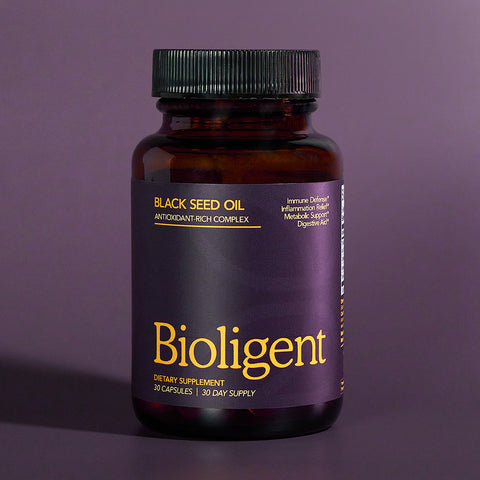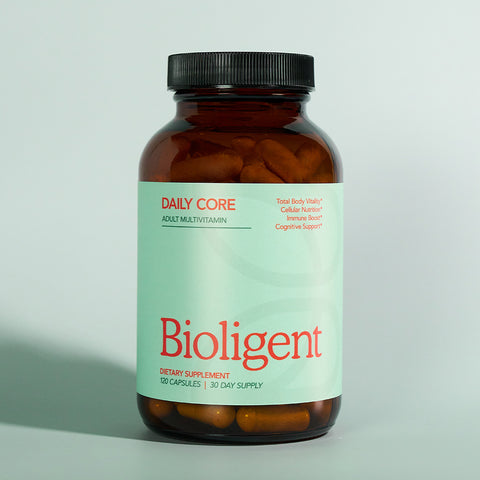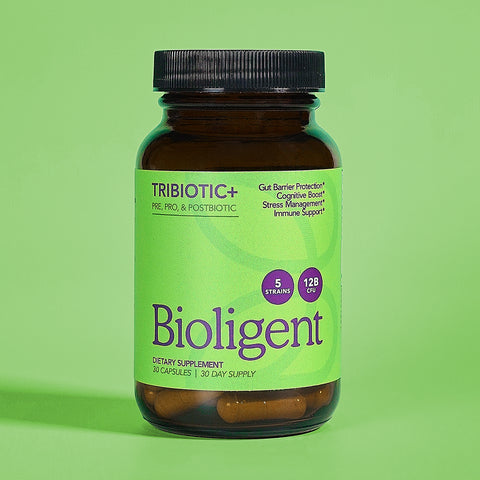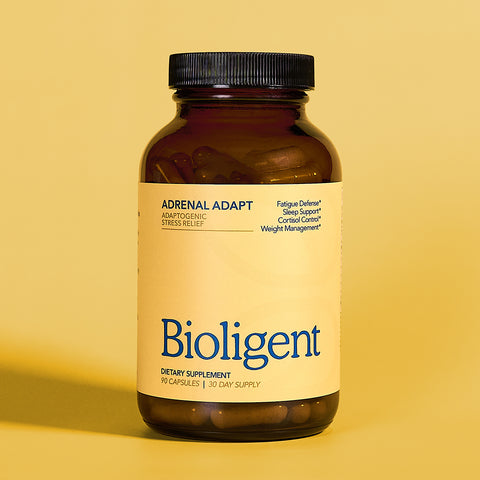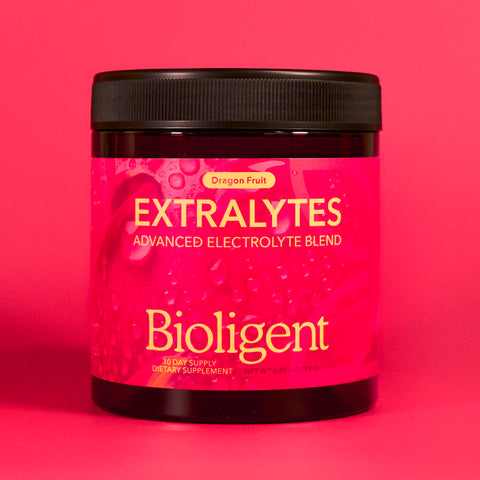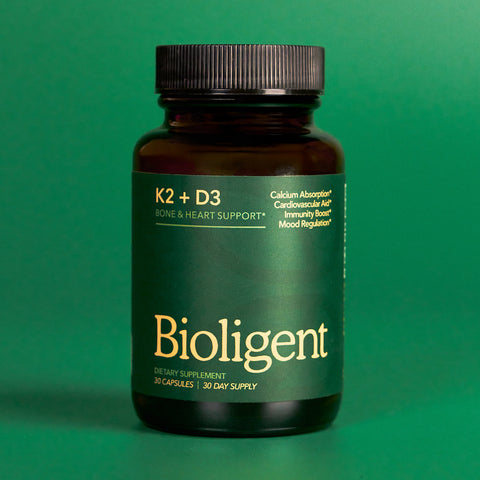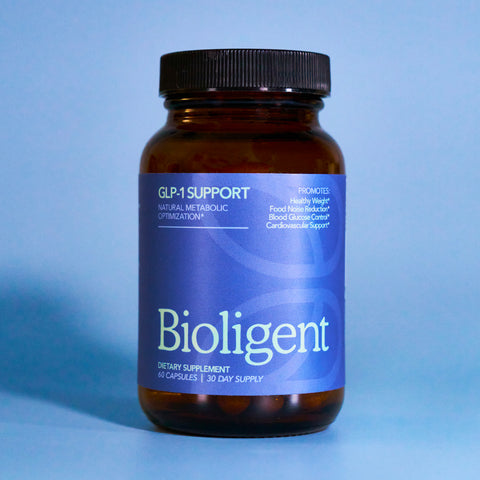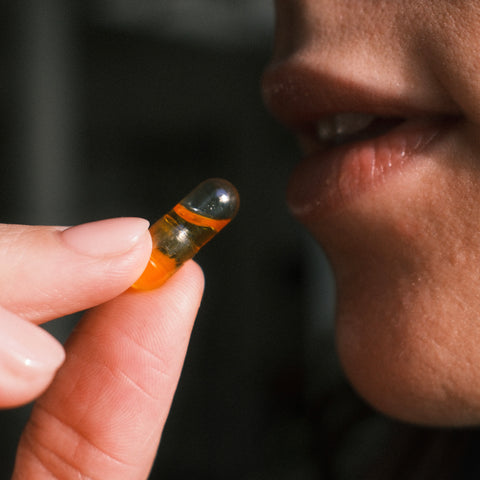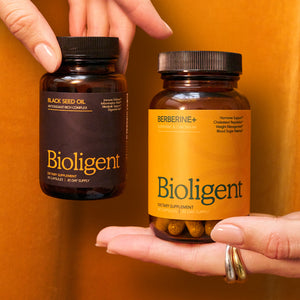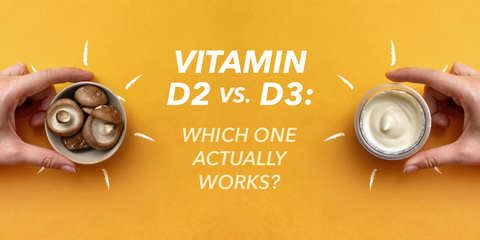Chances are you’ve seen vitamin D supplements on pharmacy shelves and wondered if it really matters whether you take D2 or D3. After all, both claim to support bone health, immunity, and overall wellness — but are they really created equal?
Here’s the thing: while vitamin D is essential for helping your body absorb calcium, maintain healthy bones, support your heart, and even balance your mood, not all forms of vitamin D work the same way. D2 (ergocalciferol) and D3 (cholecalciferol) are the two most common options, but they differ in where they come from, how your body uses them, and how effective they really are.
In this article, we’re breaking down the key differences between vitamin D2 and D3, exploring why D3 tends to be more effective, and showing how pairing it with K2 can help your body put calcium exactly where it belongs: in your bones and teeth, not your arteries.

What is Vitamin D?
Before we get into the differences between D2 and D3, let’s talk about vitamin D itself. Often called the “sunshine vitamin,” vitamin D is a fat-soluble nutrient your body produces when your skin is exposed to sunlight. It also comes from certain foods and supplements, and it plays a surprisingly wide role in your overall health.
Most people think of vitamin D in terms of strong bones, and it’s true that one of its main jobs is to help your body absorb calcium. But vitamin D also supports your cardiovascular system, helps regulate your immune defenses, and even influences mood by supporting serotonin production. In short, it’s a small nutrient with a big impact.
When it comes to supplements, though, vitamin D isn’t one-size-fits-all. It comes in two main forms: vitamin D2 (ergocalciferol) and vitamin D3 (cholecalciferol). And while they might look the same on a label, your body doesn’t process them equally, which is why it’s important to know the difference.

Vitamin D2 vs D3: Side-by-Side Comparison
Now that we know what vitamin D does in the body, let’s take a closer look at the two main forms: D2 (ergocalciferol) and D3 (cholecalciferol). While they’re often grouped together on supplement shelves, your body doesn’t treat them the same way.
Here’s a quick breakdown of D2 vs D3 for health, and how they compare side by side:
|
Feature |
Vitamin D2 (Ergocalciferol) |
Vitamin D3 (Cholecalciferol) |
|
Source |
Found in plants and fungi (e.g., mushrooms exposed to UV light) |
Produced in the skin from sunlight; also found in animal-based foods like fatty fish, egg yolks, and liver |
|
Potency & Absorption |
Less potent and not absorbed as efficiently |
More potent, better absorbed and utilized by the body |
|
How Long It Lasts |
Breaks down faster, shorter duration in the body |
More stable, stays active in the body longer |
|
Effectiveness |
Can help raise vitamin D levels, but less effective at sustaining them |
Shown to be more effective at raising and maintaining vitamin D levels in the blood |
|
Common Use in Supplements |
Often used in fortified foods (like cereals and plant milks) because it’s cheaper to produce |
Preferred form in most high-quality supplements for bone, heart, and immune support |
The big takeaway from this comparison is that while both D2 and D3 technically count as “vitamin D,” your body uses them very differently.
While there are some vitamin D2 benefits, such as being plant-derived and often used in fortified foods, it doesn’t stay active in your system as long and isn’t as effective at raising your blood vitamin D levels. That means if you rely only on D2, your levels can dip more quickly, leaving your bones, heart, and immune system without the consistent support they need.
Vitamin D3, on the other hand, is the form your body naturally makes when you’re in the sun. It’s more stable, longer lasting, and more potent, making it the preferred choice if you want reliable support for calcium absorption, bone strength, cardiovascular health, and immunity.
In simple terms: Vitamin D3 benefits are significantly more effective than D2 because D3 does the heavy lifting, while D2 falls a bit short.

Why Vitamin D3 Works Best for Bones and Heart
One of the most important roles of vitamin D is helping your body absorb calcium. Without enough vitamin D, even a calcium-rich diet won’t deliver its full benefits because your body simply can’t pull in and use that calcium effectively.
This is where vitamin D3 stands out because it's the more active, reliable form of vitamin D, meaning it does a better job of making sure calcium gets into your system in the first place.
But calcium absorption is only half the story. Once calcium is in your bloodstream, it needs to be directed to the right places (your bones and teeth) rather than ending up in your arteries or soft tissues. That’s where vitamin K2 comes in. K2 acts like a traffic director, guiding calcium to where it belongs and helping to keep your cardiovascular system clear and healthy.
When paired together, vitamin D3 and K2 create a powerful nutrient duo: D3 boosts calcium absorption, and K2 ensures that calcium is deposited in the right places.
The result? Stronger bones, healthier circulation, and a lower risk of calcium ending up where it shouldn’t. It's the exact reason Bioligent’s K2 + D3 formula was designed, and that’s to give you both nutrients in one smart, daily supplement.

Additional Benefits of Vitamin D3
Vitamin D3’s advantages don’t stop with bones and heart health. Research shows it also plays an important role in two other key areas of wellness:
Immune balance
Vitamin D3 helps activate the immune cells that protect your body from harmful pathogens. It also supports respiratory defenses, making it a nutrient that helps your immune system stay resilient year-round.*
Mood and emotional well-being
As the “sunshine vitamin,” D3 is linked to serotonin production, a neurotransmitter that influences mood. This connection helps explain why adequate vitamin D levels are often associated with better emotional balance and overall mental well-being.*
While sunlight and certain foods provide vitamin D, most people don’t consistently get enough to maintain optimal levels. That’s why many turn to supplementation, with vitamin D3 standing out as the form your body can use most effectively.

D2 or D3? Here’s the Verdict
When it comes to supporting your bones, heart, and overall wellness, vitamin D3 outperforms D2 in both potency and effectiveness. And when combined with vitamin K2, it becomes even more powerful: helping calcium go where it’s needed most while keeping your arteries clear.
So, if you’re serious about protecting your long-term health, why settle for the less effective option? Bioligent’s K2 + D3 offers a thoughtful, science-backed solution designed to give your body the best of both worlds.
Ready to give your bones and heart the support they deserve?
Try Bioligent’s K2 + D3 today and feel the difference it can make in your everyday wellness.
Frequently Asked Questions:
Can I get enough vitamin D from food alone?
It’s tough because only a few foods naturally contain vitamin D, like fatty fish, egg yolks, and liver. That’s why sunlight and supplementation often play an important role.
Does vitamin D2 work as well as D3?
Not exactly. While both forms are converted into active vitamin D in the body, D3 is absorbed and retained more efficiently than D2.
Can too much vitamin D be harmful?
Yes, excessive intake of vitamin D, whether D2 or D3, can lead to toxicity, causing nausea, weakness, or calcium buildup. Always stick to recommended doses.
Why do some supplements combine vitamin D3 with vitamin K2?
Because they work better together. D3 helps your body absorb calcium, and K2 directs that calcium to your bones and teeth instead of your arteries. Bioligent’s K2 + D3 pairs them together in one formula, making it easier to support both bone strength and cardiovascular health.
Should I take vitamin D2 or D3 if I don’t get much sun?
D3 is the better option for most people with limited sun exposure, since it’s more bioavailable and helps maintain steady vitamin D levels.
How can I tell if I’m low in vitamin D?
Some people notice things like low energy or mood changes, but the only reliable way to know is through a blood test with a healthcare professional.
Can children and older adults take vitamin D3 supplements?
Yes, vitamin D is used across different age groups, but the right amount can vary. It’s always best to check with a healthcare provider before starting a supplement routine.
